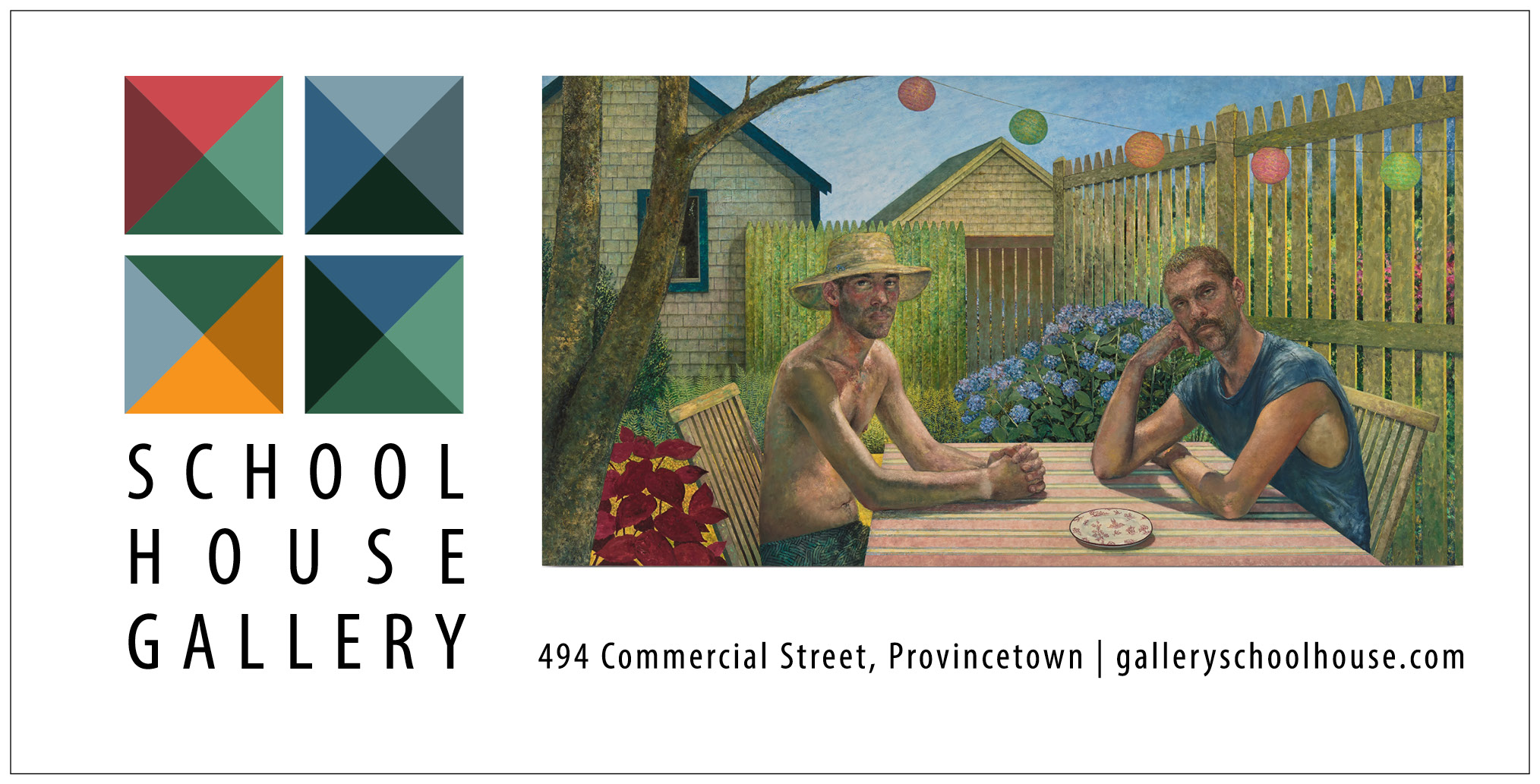Rediscovering the Life and Art of Earle Pilgrim
A new exhibition at the Truro Public Library sheds light on a mid-century Black American artist whose life and work constitute a little-known chapter in the history of the creative community of the Outer Cape.
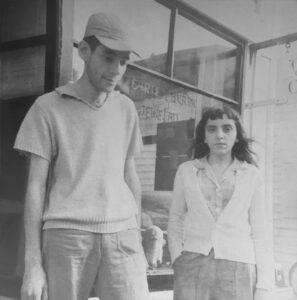
Born in Brooklyn in a family that had emigrated to the United States from Barbados in the late 19th century, Earle M. Pilgrim (1923-1976) studied at the Art Students League and worked at Sotheby’s auction house in New York City before coming to Provincetown in the early 1950s to study with Henry Hensche at the Cape School of Art. Along with his wife, artist Lily Touma, Pilgrim opened an art gallery and shop at 393 Commercial St. (now the Utilities Home store) that operated from 1951 to 1954, where they sold jewelry and paintings made by Pilgrim and showed the work of other artists. Pilgrim also taught jewelry design at adult vocational classes in Truro. The couple moved to Boston in 1954, where Pilgrim began to exhibit signs of mental illness. He spent much of the rest of his life in and out of psychiatric institutions in Boston and New York City, where he died in 1976.

The exhibition at the Truro library includes paintings made by Pilgrim during his years studying with Hensche as well as examples of his jewelry designs. Several of the paintings were never exhibited in commercial galleries.

The exhibition is curated by Peter Stebbins, who will discuss Pilgrim’s life and career and the process of discovering and disseminating the artist’s work in a free talk at the library on Thursday, Oct. 3 at 6 p.m. The show is on view until Oct. 31. See trurolibrary.org for more information. —John D’Addario
Eilen Jewell’s Songs of Resilience and Triumph
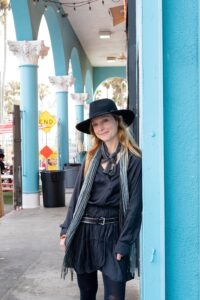
Almost everyone has a moment in life when they wonder if they’re supposed to be someplace else, whether professionally, personally, spiritually, or geographically. For rockabilly, country, and blues musician Eilen Jewell, who will perform with her band at Payomet Performing Arts Center on Saturday, Sept. 29, that moment was when she was living in Massachusetts and realized she needed to return home to Idaho, a place she’d always tried to leave.
“I was working in a very urban coffee shop,” she told NPR in a 2023 interview. “On the radio, suddenly out of nowhere, was Loretta Lynn, and she was singing ‘Honky Tonk Girl.’ The song and the twang in her voice and the space between the notes made me think of Idaho. Eventually it dawned on me that home was Idaho, and that’s where I wanted to come back to.”
With Boise as her base, Jewell has brought her Americana sound — she calls it “vintage roots-noir” — to audiences all over the U.S., Canada, and Europe. Along the way, she’s recorded 13 albums (nine of them in the studio) and won accolades for her songwriting and stylized vocals, which evoke Norah Jones and Eva Cassidy.
Jewell is currently touring on the strength of her 2023 album Get Behind the Wheel, a compilation of nine original songs that she describes as stories of “hope, loss, grief, bitterness, and the triumph of the human spirit.”
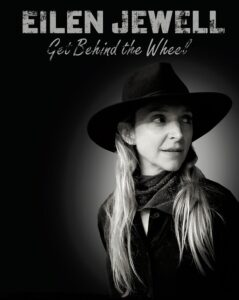
The album is deeply personal: Jewell wrote the songs in the aftermath of the pandemic when her marriage and band fell apart. She moved to a remote cabin in the mountains to try to figure out how to put her life back together, turning to meditation and psychedelics as she attempted to make meaning of what had happened to her and wondered if she would ever write or perform songs again.
“Losing so much so fast forced me to figure out what really mattered,” she says. “It made me realize that I’ve only got this one life, and I’d better get back behind the wheel if I want to make the most of it.”
That theme of resilience runs through many of the songs on Get Behind the Wheel, like “Silver Wheels and Wings”: “We’re coming apart at the seams,” sings Jewell. “Nothing is as it should be/ But look at what darkness brings/ Silver wheels and wings.”
Tickets for the Sept. 29 concert are $25 to $40, plus fees, at payomet.org. —Katy Abel
Stories of Crisis, Grief, and Healing

“There are a few places in this country that feel to me, all these years later, hollowed out by AIDS, and Provincetown is one of them,” wrote Masha Gessen in a 2018 New Yorker essay in which they describe the town as a “community center and collective hospice for thousands of dying young men, one of the few safe havens in the country at a time when many of the rights and freedoms the LGBT community enjoys today were not at all assured.” During those difficult years, the Unitarian Universalist Meeting House became a key presence as a space for collective grief and healing.
At the Gifford House on Saturday, Sept. 29, four storytellers will share some of their personal experiences of the era in “Love in the Dark,” an event produced by the Generations Project. Founded in 2015 by executive director Wes Enos, the project aims to bring LGBTQ history to life through storytelling.
According to the project’s creative director, Adam Golub, the event commemorates a milestone in AIDS and HIV treatment: “We’re approaching the 30th anniversary of the protease inhibitor being developed,” he says. The occasion is an opportunity to reflect on a difficult time and how much has changed in the three decades since.
The event will feature four speakers, including the Rev. Kim Crawford Harvey, who was the Unitarian Universalist minister here in the mid-1980s; Jane Lee, a former UU board president;
Bill Clark, who founded an AIDS ministry at the UU; and Provincetown songwriter and musician Peter Donnelly, whose partner died of AIDS.
Tickets for the event are $20 in advance and $25 at the door; $50 reserved seats are also available. See thegenerationsproject.org and giffordsprovincetown.com for more information. —Pat Kearns
Richard Neal’s Paintings of Force and Fury
Ceremony, a giant oil and mixed-media work by Richard Neal, is full of texture and temperatures. It feels like looking into the pit of a bonfire at Herring Cove at sunset as piles of clothes burn and bold, dark colors swarm around the flames. The pit is still hot and rimmed with charcoal. A pier is lit up in the distance, and a bright strip of pink rips through the darkness.
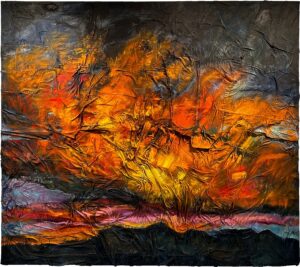
“There is a lot of fury here,” says curator David Wright in the exhibition material for Neal’s show “Ever and Ever,” currently on view at the Provincetown Art Association and Museum.
Other pieces in the exhibition convey a similar charged mood. In Adam’s Own, an oil and enamel portrait on panel, the subject is depicted with raised lips and a carved mouth. Neal brings us almost uncomfortably close to the figure as he squeezes the face into the confines of the frame. With a forceful application of paint, Neal stipples, scars, and scores the surface of the panel, which is full of drips and streaks.
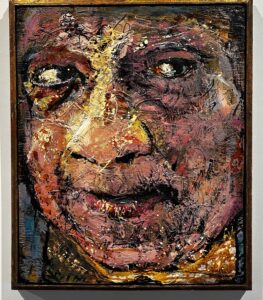
Neal also uses oil and mixed media in Knockout. The rough surface appears volcanic. Drips of teal and honeycomb brighten the rubble. A zipper runs across the work, leading us to believe at first that something concealed underneath might burst through. But the zipper is open at the end, and we can see that what’s inside is just ash and charcoal, which invites us to look closer, as though we were excavating.
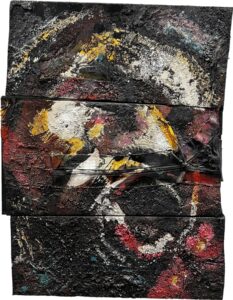
As we step away, we see the piece is a portrait of a boxer howling with mouth wide open: an example of how, in Wright’s words, the artist “carves, caresses, cauterizes, and cajoles his creations into existence in an effort to stitch together a broken world.”
The show is on view through Nov. 11. See paam.org for information. —Pat Kearns
A New Play Traps Us With Tough Questions
In a one-room cottage in the woods of Provincetown, two lifelong friends meet for a conversation that lasts through the night. That’s the premise of Provincetown- and Northampton-based playwright Meryl Cohn’s new play, The Fade-Away Advantage, which will have its world premiere at the Provincetown Theater on Thursday, Oct. 3 at 7 p.m.

The mood of the play is claustrophobic, says director Rebecca Berger: “There’s this looming sense of doom, of time pressing in on them.” As Michaela, played by D’Arcy Dersham, and Jojo, played by Susan Lambert, talk through the night about the future of their friendship, the only way out is forward.
Two other characters occasionally interrupt the action: Baby, played by Janet Geist Moore, who is the Airbnb host of the cottage where the two friends meet, and Alfred, played by Nathaniel Taylor, whose relationship to Baby is a surprise not to be spoiled.
Cohn’s script makes room for each of the distinct personalities in the play. “She’s a wonderful writer,” says Berger. “She has a really brilliant, very wry sense of humor.” The audience should buckle up, she says, for a story that’s intense, but “always funny.”
In the end, it’s a play that asks real questions. “What does a lifelong friendship look like?” says Berger. “When you reach middle age, how does it change? What does it mean to keep a promise to a friend?”
The play runs Thursdays through Sundays from Oct. 3 to 20. Tickets are $55, plus fees, at provincetowntheater.org. —Dorothea Samaha

